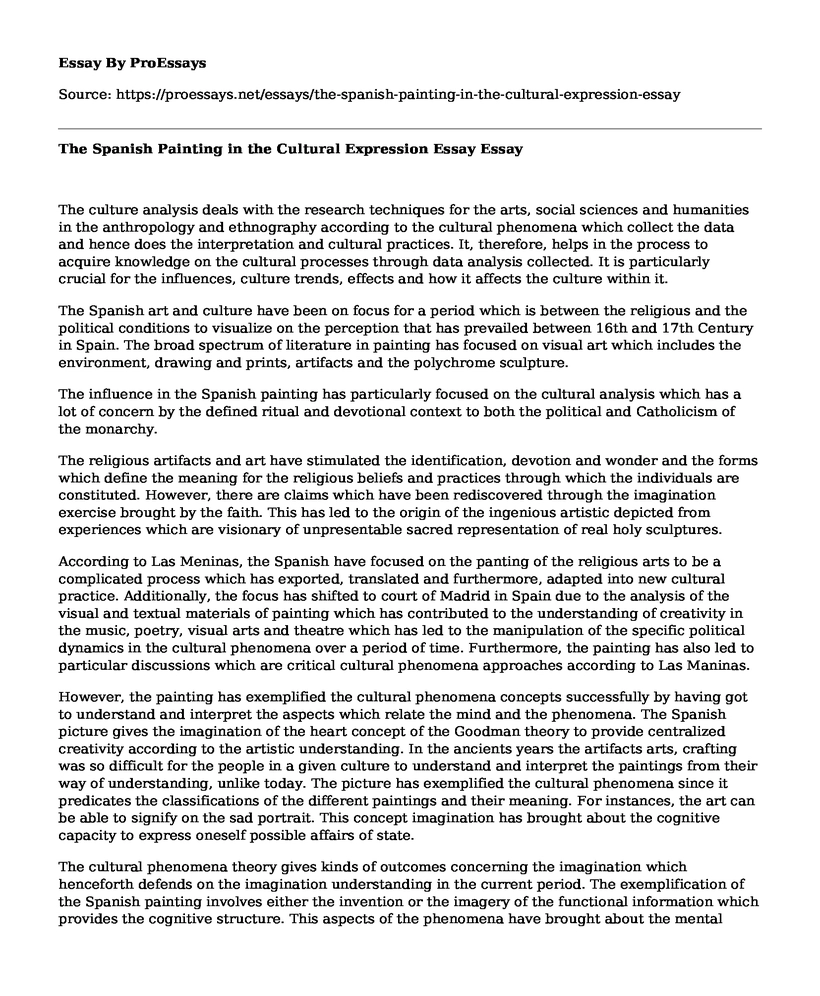The culture analysis deals with the research techniques for the arts, social sciences and humanities in the anthropology and ethnography according to the cultural phenomena which collect the data and hence does the interpretation and cultural practices. It, therefore, helps in the process to acquire knowledge on the cultural processes through data analysis collected. It is particularly crucial for the influences, culture trends, effects and how it affects the culture within it.
The Spanish art and culture have been on focus for a period which is between the religious and the political conditions to visualize on the perception that has prevailed between 16th and 17th Century in Spain. The broad spectrum of literature in painting has focused on visual art which includes the environment, drawing and prints, artifacts and the polychrome sculpture.
The influence in the Spanish painting has particularly focused on the cultural analysis which has a lot of concern by the defined ritual and devotional context to both the political and Catholicism of the monarchy.
The religious artifacts and art have stimulated the identification, devotion and wonder and the forms which define the meaning for the religious beliefs and practices through which the individuals are constituted. However, there are claims which have been rediscovered through the imagination exercise brought by the faith. This has led to the origin of the ingenious artistic depicted from experiences which are visionary of unpresentable sacred representation of real holy sculptures.
According to Las Meninas, the Spanish have focused on the panting of the religious arts to be a complicated process which has exported, translated and furthermore, adapted into new cultural practice. Additionally, the focus has shifted to court of Madrid in Spain due to the analysis of the visual and textual materials of painting which has contributed to the understanding of creativity in the music, poetry, visual arts and theatre which has led to the manipulation of the specific political dynamics in the cultural phenomena over a period of time. Furthermore, the painting has also led to particular discussions which are critical cultural phenomena approaches according to Las Maninas.
However, the painting has exemplified the cultural phenomena concepts successfully by having got to understand and interpret the aspects which relate the mind and the phenomena. The Spanish picture gives the imagination of the heart concept of the Goodman theory to provide centralized creativity according to the artistic understanding. In the ancients years the artifacts arts, crafting was so difficult for the people in a given culture to understand and interpret the paintings from their way of understanding, unlike today. The picture has exemplified the cultural phenomena since it predicates the classifications of the different paintings and their meaning. For instances, the art can be able to signify on the sad portrait. This concept imagination has brought about the cognitive capacity to express oneself possible affairs of state.
The cultural phenomena theory gives kinds of outcomes concerning the imagination which henceforth defends on the imagination understanding in the current period. The exemplification of the Spanish painting involves either the invention or the imagery of the functional information which provides the cognitive structure. This aspects of the phenomena have brought about the mental activity which provides a theory of different exemplification thinking imagination which are proportional in other terms which hence affects the cultural expression in the phenomena in the past and the current culture.
The culture in the Spanish painting of the art has been the subject to the globalization process in the culture since the elements which are non-universal has modified the artwork contained in the phenomena. The cultures in the recipients have lacked competence which is required for the comprehensive and extensive reading capability which has decreased the work content. The painting requires the creative art content creation which needs skills in technological, furthermore in the artistic work such as the cultural artifacts, poetry, music. The culture over a period has brought about the variations in the cultural content which has various diversifications.
In some other way, the Spanish painting of the art has denied the freedom of painting works because of objectivity and activity which has the relativism to the broader cultural phenomena that gives the interpretation of the work content. The competence is the artistic ability to provide the painting with adoption according to the conversational skill for the interaction of the artifacts and arts which has the elements of the imaginations and the picture with transfer technique on the visual and the content work.
Conclusion
In conclusion, the Spanish painting in the cultural expression in the phenomena for both visual and textual content convey a lot of works with the identity and meaning for cultural practices for a specified period. The painting has the multidimensional character and cultural phenomena for the ground experience over the period in the cultural analysis. It is therefore essential to consider the Spanish picture to observe the cultural practices since it has some moral values and lessons that bring unity among people.
Cite this page
The Spanish Painting in the Cultural Expression Essay. (2022, Sep 22). Retrieved from https://proessays.net/essays/the-spanish-painting-in-the-cultural-expression-essay
If you are the original author of this essay and no longer wish to have it published on the ProEssays website, please click below to request its removal:
- Art Essay Example: Still Life by Georges Braque
- Report Example on TV Advertising: Evolution and Adaptation to the Digital Era
- Biased Research: A Major Cause of Wrong Decision-Making
- Paper Example on Adjusted Families: Understanding External and Internal Influences
- Sharpening Writing Skills: A Course for Success - Essay Sample
- Essay Sample on Brazilian Art and Culture Redefined: Musica Popular Brasileira (MPB) in the 70s
- Essay Example on The Beatles: The Greatest Rock and Roll Band of All Time







